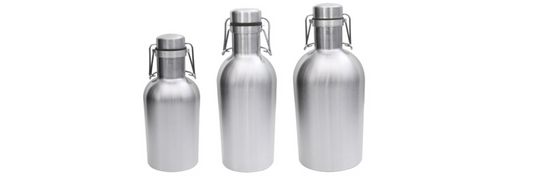Freezing food is a great way to preserve freshness and reduce waste, but not all storage containers are created equal. Mason jars, with their rustic charm and functional design, are a popular choice for freezing food. However, many people wonder: Can you freeze mason jars safely? The answer is yes, but it requires the right techniques to avoid breakage and keep your food in top condition. This guide will cover why mason jars are an excellent option for freezing, the best types of mason jars to use, step-by-step instructions for safe freezing, and common mistakes to avoid.
- Mason Jars: The Ultimate Guide to a Timeless and Eco-Friendly Storage Solution
- Round Vs Square Glass Jars: Which Is the Best for Your Needs?
- Is It Safe to Freeze Food in Glass jars? Types of Foods Can Freeze in Glass Jars
Can Mason Jars Go in the Freezer?
Yes, mason jars can go in the freezer, but you must take precautions. Freezing improperly can cause jars to crack or shatter due to the expansion of liquids and rapid temperature changes. With the right types of jars and proper techniques, you can safely freeze foods in mason jars for months.

Why You Should Freeze Food in Mason Jars
1. Easy and Convenient
Freezing food in mason jars is straightforward. They’re easy to fill, stack, and store, making them perfect for batch cooking or meal prepping.
2. Limited Equipment Needed & Cost-Effective
Mason jars are an inexpensive option compared to specialty freezer containers. Most households already have a few mason jars lying around, which means you don’t need to purchase additional storage solutions.
3. Toxin-Free & Sustainable
Unlike plastic containers, mason jars are free from toxins like BPA, making them a safer choice for long-term food storage. Their reusable nature also supports a more sustainable lifestyle.
4. Reduce Food Waste
Freezing leftovers or seasonal produce in mason jars helps you cut down on food waste. You can portion meals, store small amounts of sauces, or preserve fruits and vegetables with ease.
Types of Mason Jars Suitable for Freezing
1. Wide-Mouth Mason Jars
Wide-mouth mason jars are ideal for freezing because their straight sides allow food to expand without creating pressure points. They’re also easier to fill and clean.
2. Straight-Sided vs. Shoulder Jars
Straight-sided jars are better suited for freezing. Shoulder jars, which curve inward near the top, can trap food and increase the risk of breakage as the contents expand.

Steps to Freeze Mason Jars Safely
1. Preparing the Jar
- Start by selecting jars that are labeled as freezer-safe.
- Ensure jars are clean and free of chips or cracks, as imperfections can cause breakage during freezing.
- Both metal and plastic lids work, but plastic lids are often preferred for freezing because they don’t rust and are easier to handle.
2. Packing the Jar
- Allowing for Expansion: The Role of Headspace
- Always leave about 1–2 inches of headspace to accommodate the expansion of food as it freezes.
- Packing Liquids vs. Solids
- For liquids, avoid filling the jar to the brim. Solids can be packed more tightly but still need room to expand.
3. Cooling Before Freezing
Allow hot contents to cool to room temperature before placing them in the freezer to prevent thermal shock.
Common Mistakes When Freezing Mason Jars
- Using Jars with Shoulders: Shouldered jars are more prone to breakage because of their curved design.
- Rapid Temperature Changes: Placing hot jars directly into the freezer can cause thermal shock and cracking.
- Overfilling the Jar: Too little headspace can lead to pressure buildup and jar breakage.
- Freezing Foods with Incorrect Headspace: Different types of foods expand at different rates, so leaving adequate headspace is crucial.
- Filling the Jar with Hot Contents: Hot contents can weaken the glass and increase the risk of cracking.
Tips to Prevent Breakage
- Avoid Overfilling: Always follow recommended guidelines for headspace.
- Store Jars in the Freezer Safely: Place jars upright and avoid crowding to prevent them from tipping or bumping into one another.
- Dealing with Temperature Changes: Let jars thaw gradually in the refrigerator or at room temperature. Avoid placing frozen jars directly in hot water or the microwave.
- Gradual Thawing Methods: To prevent breakage, move jars from the freezer to the fridge for a few hours before using.
FAQs: Can You Freeze Mason Jars?
1. Can You Freeze Liquids in Mason Jars?
Yes, but leave enough headspace for expansion to prevent cracking.
2. What Foods Can Be Safely Frozen in Mason Jars?
Soups, sauces, fruits, vegetables, and even grains can all be frozen in mason jars.
3. How Much Headspace Should I Leave in Mason Jars When Freezing?
Leave at least 1 inch for liquids and ½ inch for solids.
4. Are Plastic Lids Better Than Metal Lids for Freezing?
Plastic lids are often preferred because they don’t rust and are easier to remove.
5. Why Do Mason Jars Break in the Freezer?
Breakage usually occurs due to overfilling, rapid temperature changes, or using jars with shoulders.
6. How Long Can Frozen Food Last in Mason Jars?
Properly frozen food can last 3–6 months in mason jars, depending on the type of food.
7. Can You Freeze Fruit in Mason Jars?
Yes, fruits like berries, sliced peaches, and applesauce freeze well in mason jars.
Conclusion
Freezing in mason jars is a convenient, sustainable, and safe way to store food when done correctly. To avoid breakage, choose wide-mouth jars, leave adequate headspace, and handle temperature changes gradually. With these tips, you can make the most of your mason jars while reducing food waste and keeping your meals fresh.









